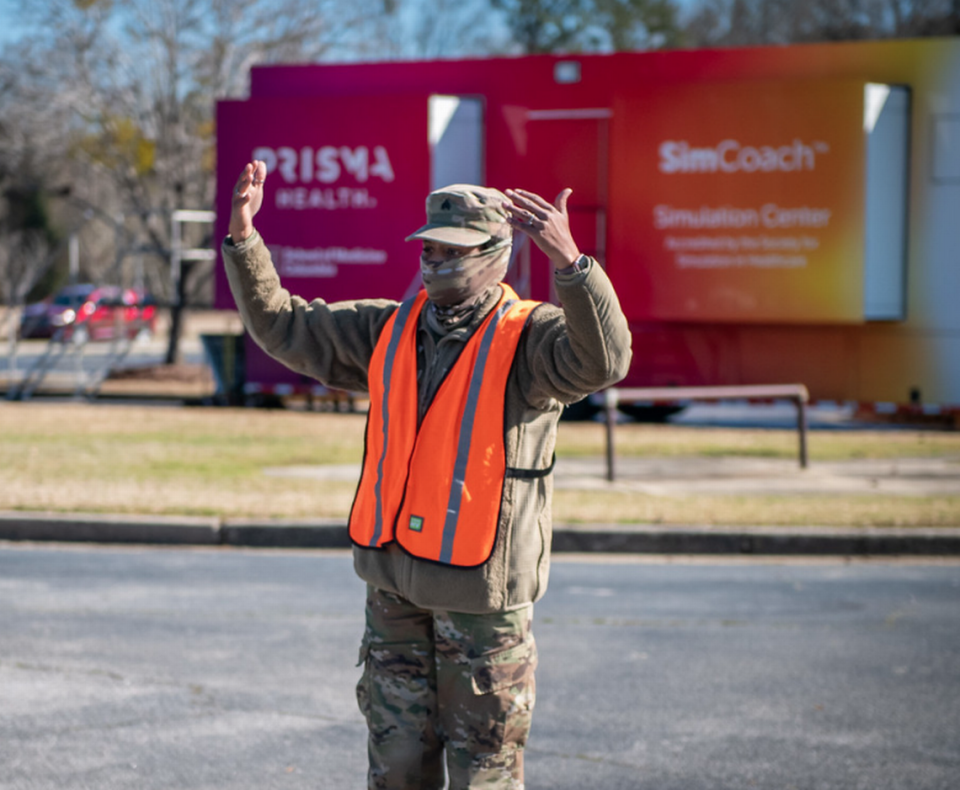Shots on the go? SC forming mobile COVID vaccination fleet to rove around the state

South Carolina’s health department is establishing a fleet of mobile vaccination units to travel the state’s rural, disadvantaged and hard-to-reach areas this summer in search of residents willing to roll up their sleeves for COVID-19 shots.
Still in its early stages, the project is the Department of Health and Environmental Control’s latest attempt to lift the state’s middling vaccination rate by meeting residents where they live, work, worship and play.
“Mobile units help support our ongoing efforts to bring vaccines to residents instead of asking residents to come to vaccine administration sites,” DHEC spokeswoman Laura Renwick said.
In the early days of South Carolina’s vaccine rollout, residents typically made appointments for COVID-19 shots at hospitals, health clinics and pharmacies, or waited hours in their cars at mass drive-through clinics. But as demand for the vaccine has waned — daily vaccinations are down about 75% from their late-March peak — health officials have turned to more creative approaches to get shots in arms.
To boost vaccination rates, DHEC has invested in vaccine education, outreach and targeted messaging aimed at the state’s least vaccinated populations; offered vaccine incentives like free beer at participating local breweries; and this summer plans to set up vaccine booths at fairs, festivals and ballparks across the state.
Despite the agency’s efforts, South Carolina’s vaccination rate ranks 41st in the country, according to the U.S. Centers for Disease Control and Prevention. Only 47% of eligible residents have gotten at least one shot and 40.6% are fully vaccinated, according to DHEC data.
In more than a third of the state’s 46 counties, nearly all of them rural, fewer than 40% of eligible residents have been vaccinated.
Some of those unvaccinated residents may not want a shot, no matter how easy DHEC makes getting one, but the agency believes others remain unvaccinated because of access issues and would be open to rolling up their sleeves if it was convenient.
The mobile units, which will run seven days a week, 10 hours a day in all four regions of the state, should help reach those folks.
They’ll be deployed to places like gas stations, small businesses, parks and recreation centers, and will be able to vaccinate people on foot as well as in vehicles, DHEC officials said.
Residents interested in getting a shot can make an appointment in advance or simply walk up to the mobile clinic for a free inoculation.
The one-shot Johnson & Johnson vaccine is ideal for this type of program, Renwick said, but DHEC also hopes to administer Moderna and Pfizer brand shots out of its mobile units, where possible.
The number of doses stocked on the units is likely to start small, but could ramp up once the operators get comfortable with the process.
The health department is currently soliciting proposals from experienced mobile health vendors to operate the roving units and anticipates awarding contracts to one or more operators by the end of the month.
Once under contract, DHEC and the vendors will work together to establish and promote mobile vaccination routes in the Midlands, Upstate, Pee Dee and Lowcountry, Renwick said. The mobile units will run from 9 a.m. to 7 p.m. daily, to start, but could have their hours and days of operation modified in the future, depending on demand.
Specifics won’t be finalized until contracts are awarded, but it’s a good bet the program will resemble the recent mobile vaccination efforts of CareSouth Carolina.
CareSouth, a federally qualified health center with 14 primary care clinics across the state, isn’t in on the bidding for DHEC’s mobile vaccination contract, but has been using mobile health vans to administer COVID-19 shots in five Pee Dee counties.
DHEC gave the health center its “Community Hero” award earlier this month for its mobile vaccination work in rural and underserved communities.
Since March, the health center has been administering Johnson & Johnson doses out of vans in Chesterfield, Darlington, Dillon, Lee and Marlboro counties.
The vans, which were purchased early in the pandemic to assist with mobile COVID-19 testing and subsequently converted into vaccination units, are equipped with pharmacy-grade refrigerators, freezers and other healthcare technology, CareSouth’s chief nursing officer Tracie Thigpen said.
Three people staff each van — a social service worker for registrations, a medical assistant for documentation and a licensed practical nurse for vaccinations — and typically set up shop outside churches, dollar stores and laundromats in each county daily.
Some people seek out the mobile units — their daily locations are advertised on social media — but others just happen upon the units in the course of their normal daily activities, Thigpen said.

 Yahoo Finance
Yahoo Finance 